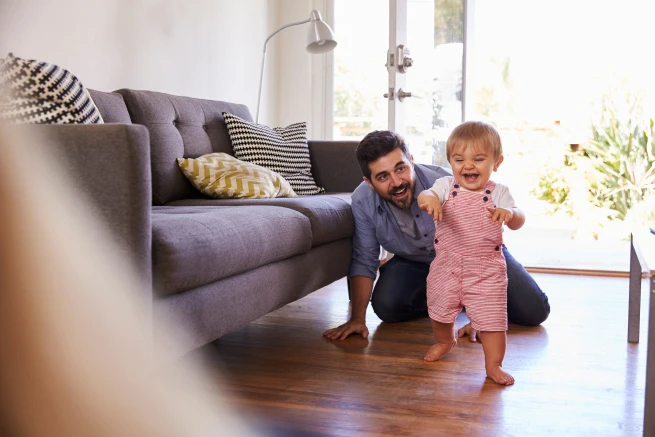What is a normal night’s sleep for a child?
Healthcare professional Dawn Kelly says: “As parents, you are best placed to know just how much sleep your little one requires and there is no magic number of hours that each particular child should have. This guide is the approximate hours of sleep that children of a particular age should aim for:
1 week old – 8 hours in the day, 8.5 hours at night
4 weeks old– 6-7 hours in the day, 8-9 hours at night
3 months old– 4-5 hours in the day, 10-11 hours at night
6 months old– 3 hours in the day, 11 hours at night
9 months old– 2.5 hours in the day, 11 hours at night
12 months old– 2.5 hours in the day, 11 hours at night
2 years – 1.5 hours in the day, 11.5 hours at night
3 years – 0-45 minutes in the day, 11.5-12 hours at night
4 years - 11.5 hours at night
5 years - 11 hours at night
6 years – 10hrs 45mins at night
7 years – 10hrs 30mins at night
8 years– 10hrs 15mins at night
9 years– 10 hours at night
10 years– 9hrs 45mins at night
11 years - 9hrs 30mins at night
12 years- 9hrs 15mins at night
As well as getting the right amount of sleep, the quality of sleep is also very important. Uninterrupted sleep plays an essential role in helping your child develop, and little naps during the day also play an important role in keeping your little one alert.
This content was written by healthcare professional Dawn Kelly in 2020. She was paid for her time but does not endorse CALPOL® Products.
What can affect my child getting a good night’s sleep?
Two common reasons your child might not get a good night’s sleep is if they struggle to settle down, or if they wake during the night. If this is happening to your little one and causing them to suffer from a lack of sleep, there are things you can do to help. Read the section below on what you can do if your child is having trouble sleeping, for tips and advice.
If your little one is struggling to settle without you, visit the NHS website for information on a technique to use to help overcome this.
If your child is disabled or has a long-term illness, they may find it more difficult to sleep through the night. Contact and Scope are charities that information and advice for parents with disabled children.
Sleep Disorders
Nightmares - Nightmares usually occur late at night and can be very distressing and anxiety provoking for your little one. Offer your child some words of reassurance, and gently put them back to sleep if this happens.
Night Terrors - Night terrors can be distressing for parents as they often scream, shout and move their body around in extreme panic. They will not be fully awake and will rarely remember what happened in the morning. Terrors usually occur quite early in the night. It is best to try and make sure your child is safe and stays in bed if possible. There is no need to wake them. If the night terrors are occurring several times a night or most nights, make an appointment with your family doctor to discuss further.
Sleepwalking - Children are much more likely to sleepwalk if either of their parents have also done so in the past or if parents have a history of night terrors. If your child does sleepwalk, the best thing to do is to guide them back towards their bed, being careful not to wake them up or startle them. There’s no specific treatment for sleepwalking, although many children will grow out of it naturally before they reach puberty. There are some importance measures that you can take to keep your little one safe if they do sleepwalk such as making sure there is nothing breakable or hazardous in the room that they could trip over. Keeping windows and external doors locked is advisable and fitting stair gates at the top of your stairs will provide some extra peace of mind when it comes to keeping your little one safe from harm.
What is a sleep diary?
Healthcare professional Dawn Kelly says: “If your little one has problems sleeping, it is a good idea to keep a sleep diary. They are used as a tool to help diagnose any particular problems or habits that may prevent your child from getting the rest they need. The list of habits or experiences that your child has on a day to day basis may give your doctor or other health professionals a better idea of the causes behind their lack of sleep.”
This content was written by healthcare professional Dawn Kelly in 2020. She was paid for her time but does not endorse CALPOL® Products
What can I do if my child is having trouble sleeping?
There are a number of different measures you can take to try and help your little one fall asleep:
Decide on a time you want your child to sleep. When this time approaches, begin a ‘wind down’ routine that they become familiar with. This could include a bath, followed by a feed, or if they are a little older a bedtime story.
If your child has a toy, dummy or another item that provides them with comfort, let them have it before settling down into bed.
Try to keep the lights in your childs’ room dim to encourage their body to produce melatonin, the sleep hormone.
Try to keep your childs’ room a screen free zone, by remove phones, tablets and other electronic gadgets.
It is important to be as consistent as possible, and you may find yourself having to repeat routine steps for several nights.

Health Visitor
Dawn Kelly
Dawn is a qualified paediatric nurse, health visitor and lecturer with over 25 years’ experience. She’s written widely about child health and development and has a wealth of knowledge about childhood illnesses and advising parents on issues such as weaning and sleep. Her three daughters also put her knowledge to the test!
This HCP does not endorse Calpol.

